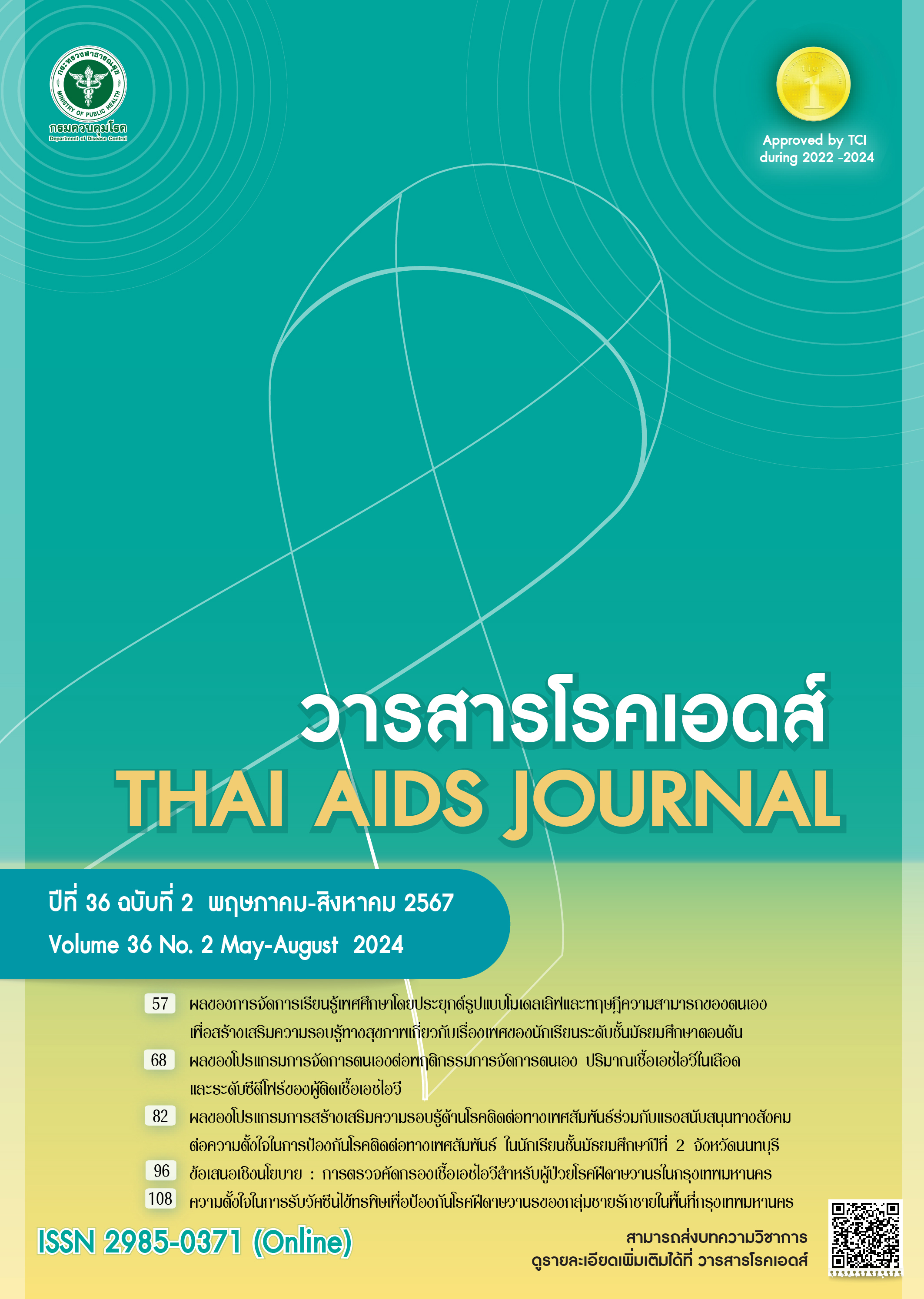ผลของโปรแกรมการจัดการตนเองต่อพฤติกรรมการจัดการตนเอง ปริมาณเชื้อเอชไอวีในเลือด และระดับซีดีโฟร์ของผู้ติดเชื้อเอชไอวี
DOI:
https://doi.org/10.14456/taj.2024.7คำสำคัญ:
ผู้ติดเชื้อเอชไอวี, โปรแกรมการจัดการตนเอง, พฤติกรรมการจัดการตนเอง, ปริมาณเชื้อเอชไอวีในเลือด, ระดับซีดีโฟร์บทคัดย่อ
การวิจัยกึ่งทดลองแบบสองกลุ่มวัดก่อนและหลังการทดลอง ศึกษาผลของโปรแกรมการจัดการตนเองต่อพฤติกรรมการจัดการตนเอง ปริมาณเชื้อเอชไอวีในเลือด และระดับซีดีโฟร์ของผู้ติดเชื้อเอชไอวี กลุ่มตัวอย่างแบ่งเป็นกลุ่มทดลองและกลุ่มควบคุมกลุ่มละ 22 คน กลุ่มทดลองได้รับโปรแกรมการจัดการตนเอง และกลุ่มควบคุมได้รับการดูแลตามปกติ เครื่องมือดำเนินการวิจัย คือ โปรแกรมการจัดการตนเอง ประกอบด้วย (1) การเลือกเป้าหมาย (2) การเก็บรวบรวมข้อมูล (3) การประมวลและประเมินข้อมูล (4) การตัดสินใจ (5) การลงมือปฏิบัติ และ (6) การสะท้อนตนเอง ระยะเวลาในการทดลอง 12 สัปดาห์ เครื่องมือเก็บรวบรวมข้อมูล ได้แก่ แบบสอบถามพฤติกรรมการจัดการตนเอง และแบบรวบรวมข้อมูลปริมาณเชื้อเอชไอวีในเลือดและระดับซีดีโฟร์ วิเคราะห์ข้อมูลโดยใช้ ร้อยละ ค่าเฉลี่ย ส่วนเบี่ยงเบนมาตรฐาน เปรียบเทียบข้อมูลก่อนและหลังทดลองภายในกลุ่มด้วยสถิติ Paired sample t-test, Wilcoxon signed-rank test และเปรียบเทียบข้อมูลระหว่างกลุ่มทดลองและกลุ่มควบคุมด้วยสถิติ independent t–test, Mann-Whitney U Test ผลการวิจัยพบว่า (1) กลุ่มทดลองมีคะแนนเฉลี่ยพฤติกรรมการจัดการตนเองหลังการทดลองสูงกว่าก่อนการทดลองและสูงกว่ากลุ่มควบคุมอย่างมีนัยสำคัญทางสถิติ (p<0.05) (2) กลุ่มทดลองมีปริมาณเชื้อเอชไอวีในเลือดหลังการทดลองแตกต่างจากก่อนการทดลองอย่างมีนัยสำคัญทางสถิติ (p<0.05) และไม่แตกต่างจากกลุ่มควบคุม และ (3) กลุ่มทดลองมีค่าเฉลี่ยระดับซีดีโฟร์หลังการทดลองสูงกว่าก่อนการทดลองและสูงกว่ากลุ่มควบคุมอย่างมีนัยสำคัญทางสถิติ (p<0.05) โปรแกรมการจัดการตนเองช่วยให้ผู้ติดเชื้อเอชไอวีสามารถส่งเสริมพฤติกรรมการจัดการตนเองได้และทำให้ระดับซีดีโฟร์สูงขึ้น
Downloads
เอกสารอ้างอิง
Office of Disease Prevention and Control Region 6 Chonburi. December 1, World AIDS Day: Office of Disease Prevention and Control Region 6 Chonburi joins to end inequalities, end AIDS, and end pandemics [Internet]. Chonburi: Office of Disease Prevention and Control Region 6 Chonburi; 2021 [cited 2023 Apr 1]. Available from: https://ddc.moph.go.th/odpc6/news.php?news=22017&deptcode=odpc6&news_views=1668 (in Thai)
Ruxrungtham K, Chokephaibulkit K, Chetchotisakd P, Chariyalertsak S, Kiertburanakul S, Putacharoen O, et al. Thailand national guidelines on HIV/AIDS treatment and prevention 2021/2022. Nonthaburi: Department of Disease Control; 2022. (in Thai)
Health Data Center. HIV-infected persons [Internet]. Phitsanulok: Ministry of Public Health; 2019 [cited 2023 Apr 1]. Available from: https://hdcservice.moph.go.th/hdc/main/index.php (in Thai)
Department of Disease Control. HIV [Internet]. Nonthaburi: Department of Disease Control; 2019 [cited 2023 Apr 1]. Available From: https://ddc.moph.go.th/disease_detail.php?d=59 (in Thai)
Creer TL. Self-management of chronic illness [Internet]. San Diego: Academic Press; 2000 [cited 2023 Apr 1]. Available from: https://doi.org/10.1016/B978-012109890-2/50047-0
Wattana C. Self-management support: strategies for promoting disease control. Journal of Phrapokklao Nursing College. 2015;26(Suppl.1):117-27. (in Thai)
Hanmon R, Kasatpibal N, Chitreechuer J. Effects of self-management enhancement on antiretroviral drug adherence and risk behaviors among people living with HIV/AIDS. Nursing Journal. 2013;40(3):40-9. (in Thai)
Wittayabumrung J, Surit P. Effects of a self-management program on knowledge, self-management behaviors and HbA1c among diabetic patients with poor glycemic control: randomized controlled trial. Journal of Nursing Science and Health. 2020;43(4):36-47. (in Thai)
Patiapinun A, Toskulkao T, Leelahakul V. The effects of self–management program of hypertensive patients with chronic kidney disease stage 3 on self–management behaviors and blood pressure. Thai Journal of Cardio-Thoracic Nursing. 2018;29(2):12-27. (in Thai)
Thongbupa S, Muengtaweepongsa S, Kommarg U. Effects of a self-management program among patients with ischemic stroke. Nursing Journal CMU. 2022;49(3):174-87. (in Thai)
Srisatidnarakul B. The methodology in nursing research. 5th ed. Bangkok: U and I Inter Media; 2010. (in Thai)
Thaiware Communication. Random Custom Generator [Internet]. Bangkok: Thaiware Communication; 2023 [cited 2023 Apr 1]. Available from: https://random.thaiware.com/random-custom-generator (in Thai)
Best JW. Research in education. 3rd ed. New Jersey: Prentice-Hall; 1977.
Chachiyo T. Nutrition and food safety for persons living with HIV [Internet]. Nakhon Pathom: Golden Jubilee Medical Center; 2022 [cited 2023 Apr 1]. Available from: https://www.gj.mahidol.ac.th/main/knowledge-2/nutrition-for-hiv-patients/ (in Thai)
Kongpibarn S, Ua-kit N, Tantikosoom P. The effect of self-management program on eating behaviors of patients with heart failure. Thai Journal of Cardio-Thoracic Nursing. 2017;28(2):82-96. (in Thai)
Promchaiman J. The effects of self-management program for knowledge and elastic resistance exercise behaviors among type 2 diabetes mellitus patients in Nakhon Pathom Hospital. Journal of Graduate Research Development and Innovation. 2023;1(1):8-20. (in Thai)
Wongtalar P. Development care model for HIV/AIDS patient with antiretroviral therapy at Ragsugkapap clinic in Nakae Hospital, Nakhon Phanom Province. Journal of Environmental and Community Health. 2021;6(3):91-103. (in Thai)
Seadsupa W, Sangchart B. The effectiveness of self-management program on antiretroviral adherence and health indicators in HIV/AIDs patient. Journal of Nurses Association of Thailand, North-Eastern Division. 2012;30(3):58-67. (in Thai)



